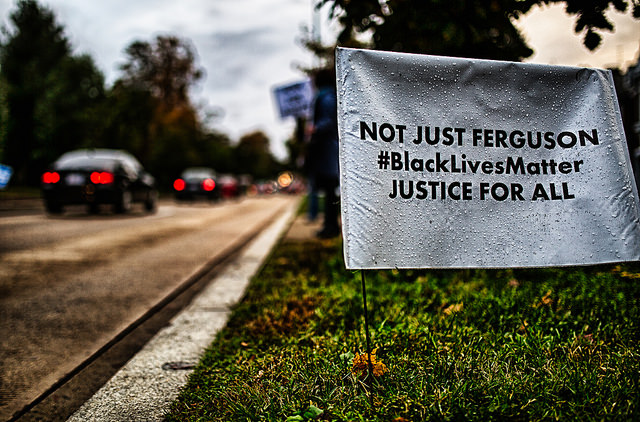WASHINGTON – Every week for two months they had marched in protest of the police killing of 31-year-old Terrence Sterling. On Monday, election eve, the protest was smaller but no less passionate.
A core of about 50 demonstrators marched across the nation’s capital, shutting down major roads and intersections, carrying signs that said “No Justice, No Peace” and chanting “Black lives, they matter here!”
While they marched in hope of forcing “justice” in the September 11 shooting of Terrence Sterling (a grand jury investigation is ongoing), Beyoncé, a leading figure of Black Lives Matter since her Super Bowl Halftime performance, was performing at a Hillary Clinton rally in Philadelphia. At the Washington event, there was scarcely a mention of the presidential election, and almost none of the protestors shared the pop star’s enthusiasm for the Democratic nominee.
Despite weeks-long efforts by black celebrities, major black organizations, and President Barack Obama, protesters in Washington – and some black acticvists elsewhere — remain unconvinced.
Out of the dozen or so protesters interviewed, most said they were voting third-party, writing in a name, or staying home altogether. Many said they voted for Sen. Bernie Sanders in the Democratic primary and some said they would write him in in the general election Tuesday.
In Washington, 36-year-old environmental sustainability expert Ronald Finch said he voted early for Green Party candidate Jill Stein.
“There’s no reason for anyone who cares about justice or black people to invest in the two party system,” Finch said. “It doesn’t help anyone here.”
Clinton voters, who were interviewed in Washington, said they framed their choice by picking the lesser of two evils.
“I have no choice,” said Arielle Montgomery, 27. “It’s like being asked if you would like to get hole-punched to death or being shot in the head. [Donald] Trump is being hole-punched to death.”
Black millennials’ lack of enthusiasm Democratic nominee has alarmed both older black leaders and committed Clinton supporters, who feared a low black turnout could hand the election to Trump.
Early voting by blacks and young people has fallen in some swing states, according to a New York Times analysis. AJoint Center poll released a week before the election showed 25 percent of black people ages 18-29 were intended to skip voting or were unsure what they would do. For ages 30-39, that number was 16 percent.
Comparing Black Lives Matter to the 1960s Student Nonviolent Coordinating Committee, Charlotte-based Black Lives Matter leader Marcus Bass said many young voters feel the entire system needs to be overhauled.
“It is the job of the NAACP and other establishment groups to back the system, and choose between the lesser of two evils,” said Bass, who is working on non-partisan get-out-the-vote efforts in North Carolina. “But there’s also supposed to be this natural (anti-establishment)rising from young people.” In the 1960s, SNCC activists advocated a more aggressive approach to fighting for civil rights the old-line black organizations.
Bass said a lot of young black North Carolinians plan to vote for reform candidates in down-ballot races, while writing in Sanders or “Black Lives Matter” on the presidential ticket.
Part of the reason for the decline in black turnout is that President Barack Obama is not on the 2016 ballot, said Paul Frymer, the political scientist who created the “captured voter” theory. The theory states that black voters’ are largely ignored because they vote en masse for Democrats. He said Clinton, like every Democratic candidate since Bill Clinton in 1992, is in line with that theory, remaining somewhat distant from black issues to avoid alienating whites.
“Clinton has not campaigned around issues important to African American voters.” Frymer said. “There’s good reasons why she doesn’t, but obviously that’s going to have an impact (on black voter turnout).”
Clinton includes calls for stronger community policing on her website and has been endorsed by the most high-profile Black Lives Matter leader, DeRay McKesson.
Although some of the Washington protesters said McKesson’s endorsement influenced them, others said Clinton’s “superpredator” comments in the 1990s and her support for the 1994 crime bill showed she doesn’t care about black people.
Obama has campaigned for Clinton vigorously, but some of the protesters said even the black president was part of the political establishment they are trying to replace.
Sitting on a curb in Washington before the Terrence Sterling protest with a neon “Black lives matter” sign, 23-year-old videographer, Terrelle Thompson said he voted for Obama in 2012 but was profoundly disappointed, and is not voting this year.
Ronald Lyles, a 20-year-old University of Maryland student, is voting for Green Party candidate Jill Stein. They said Obama has ignored police violence and other black issues.
“I have no respect for him,” Lyles said. “He’s an Uncle Tom.”
Charles Ellison, a pro-Clinton Democratic strategist, said he feared black people will be blamed if Trump wins.
Ellison is sympathetic to the argument that a third party or write-in protest vote will force future candidates to address African American issues issues, but he said “This is not the right election to do that right now. The fate of the nation is at stake.”
But For Lyles, who spent much of Monday’s night protest trying to convince bystanders to join in, the stakes are too high to vote for Clinton. Black men are dying in the street, he said, and something has to change.
“I want to see our voices heard more than they are now,” Lyles said, “because if it was heard, this wouldn’t keep on happening”

